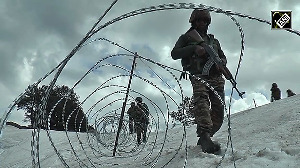Alarmed at the dwindling number of vultures, the Forest Department has decided to breed them in captivity in a special facility located in Assam.
"The Assam government, with support from the Bombay Natural History Society, has set up the Vulture Conservation Breeding Centre in Rani forest range near Guwahati," said a top forest official of the Assam government.
The centre, which will become operational soon, will initially breed the slender-billed and water-backed species of vultures. "We aim to captive breed at least 100 pairs of vultures in the next 15 years," said Vibhu Prakash, principal scientist with BNHS.
After hatching, the young birds will be hand-raised at the centre and then released in the wild.
BNHS official Debojit Das said that the process will be carried out in phases. "The process is slow and hatching and raising the birds will take time. We are collecting data and samples now," Das said.
The United Kingodm-based Royal Society for the Promotion of Birds has been supporting the establishment of vulture breeding centres in India. They have also been active in removing diclofenac, a killer veterinary drug, from the environment.
"In recognition of the urgency of the situation, we have stepped in to provide resources in time," said RSPB's vulture programme director Chris Bowden.
"We are confident that support (for the project) from within India will grow as the reality of the situation becomes more evident. But the few vultures left are declining so fast that we don't have time to wait for that." he said.
Incidentally, the slender-billed vultures, extensively found in Assam, number less than 200 in the wild today.
According to the Forest Ministry, the population of three species -- white-backed, slender-billed and long-billed -- in the wild has declined drastically in the past decade due to the use of diclofenec.
Though the controversial drug was banned by the Centre in 2006, some veterinary doctors still prescribe it.
There are two vulture conservation centres in India, one in Haryana's Pinjore and the other in Raja Bhat Khawa in West Bengal.






 © 2025
© 2025